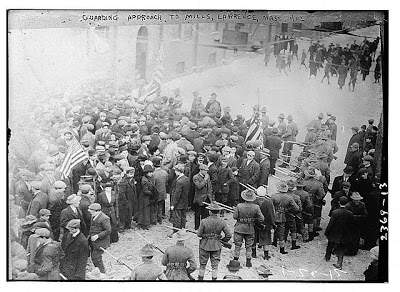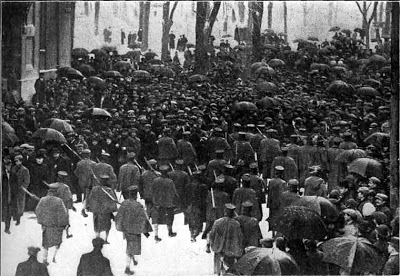I’m just beginning work on a project with The Esperanza Academy in Lawrence, MA, a middle school for girls. Holy synchronicity, Batman! It just so happens that today is the 100th anniversary of the Lawrence, MA textile strike, which you may not remember, but which, coming shortly after the Triangle Shirtwaist Fire in NYC, was an important catalyst in the history of labor rights, especially for women. Lawrence, MA was a big woolen center, made so on the backs of the workers who averaged $8.76 a week for a 56-hour work week. Yup, read it and weep. $8.76 a week is about 15.6 cents an hour.
In January of 1912, the great State of Massachusetts, ever progressive, changed a law and decreed that 54 hours was the maximum number of hours women and children could work. Yes, women and children. When the companies reduced the hours to 54 to comply with the law, they also took away the 31 cents (on average) that workers would lose due to the reduction in hours. Yeah, you read it right, 31 cents! 31 cents was worth striking for, and 20,000 people went out, yelling “Short Pay! All Out!”
The strike spread significantly and lasted ten weeks. The strike committee was a democracy, and had 56 members, representing 27 languages. My favorite factoid from the strike is that the committee had a substitute committee lined up in case they were thrown in jail. Ultimately, the work week was reduced to 50 hours,
The following poem was written by James Oppenheim and published in December 1911 in American Magazine. It quickly became an anthem for the labor movement and is still sung today, to one of three song I’ve been able to trace. The original setting was by Caroline Kohlsaat, there is an Italian tune called “Pan e Rose” by Arturo Giovannitti, which is used by the Italian Dressmakers’ Local 89 of the ILGWU (International Ladies garment Workers Union), and there’s a tune by Mimi Farina from the 1960’s which was recorded by her sister Joan Baez, which has always been one of my favorites.
As we come marching, marching in the beauty of the day,
A million darkened kitchens, a thousand mill lofts gray,
Are touched with all the radiance that a sudden sun discloses,
For the people hear us singing: “Bread and roses! Bread and roses!”
As we come marching, marching, we battle too for men,
For they are women’s children, and we mother them again.
Our lives shall not be sweated from birth until life closes;
Hearts starve as well as bodies; give us bread, but give us roses!
As we come marching, marching, unnumbered women dead
Go crying through our singing their ancient cry for bread.
Small art and love and beauty their drudging spirits knew.
Yes, it is bread we fight for — but we fight for roses, too!
As we come marching, marching, we bring the greater days.
The rising of the women means the rising of the race.
No more the drudge and idler — ten that toil where one reposes,
But a sharing of life’s glories: Bread and roses! Bread and roses!
-1911
“It was the spirit of the workers that was dangerous,” wrote labor reporter Mary Heaton Vorse. “They are always marching and singing. The tired, gray crowds ebbing and flowing perpetually into the mills had waked and opened their mouths to sing.”
Can’t have too much marching and singing, no ma’am. You cannot have too much of that.
So, back to Esperanza. I hope to help these girls tell their stories and sing, and together we’ll figure out how to work with and honor the gifts we’ve been given. We’ll see how their stories are woven into the fabric of the larger community narrative and we’ll all learn a lot. Can’t wait.


